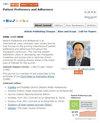探索患者对 CT 辐射信息的偏好:弥合患者偏好与医生实践之间的差距
IF 2
3区 医学
Q2 MEDICINE, GENERAL & INTERNAL
引用次数: 0
摘要
背景:CT 扫描利用电离辐射对患者的健康构成威胁。因此,告知患者电离辐射的相关信息对于促进共同决策和改善医患沟通至关重要。然而,很少有研究对这一主题进行广泛研究:本研究旨在确定医生在下达 CT 扫描医嘱前告知患者辐射风险的频率,并探讨患者的人口统计学特征与他们对 CT 扫描相关辐射风险的认识之间的关联:在沙特阿拉伯利雅得的一家三级医院对 387 名接受过 CT 扫描的患者进行了横断面研究。数据通过结构化问卷进行电话访问收集。采用卡方检验来评估患者的人口统计学特征与他们对 CT 扫描辐射风险的认识之间的关联:在了解相关知识方面,58% 的患者知道 CT 扫描会产生有害辐射。这种认知与较高的教育水平和以往使用 CT 扫描的经验明显相关。关于医生向患者提供扫描相关信息的做法,344 名(88.9%)患者表示他们的医生向他们解释了为什么需要进行扫描。只有 28 名(7.2%)患者表示他们的医生提到了辐射量,74 名(19.1%)患者表示医生提到了与扫描辐射相关的风险。几乎所有患者(96.9%)都希望医生告诉他们为什么需要进行 CT 扫描:结论:绝大多数接受 CT 扫描的患者没有获得足够的关于扫描危害的信息。结论:绝大多数接受 CT 扫描的患者都没有获得足够的关于扫描危害的信息,但他们中的大多数人都希望了解这种危害。本文章由计算机程序翻译,如有差异,请以英文原文为准。
Exploring Patient Preferences for Information About CT Radiation Exposure: Bridging the Gap Between Patient Preference and Physician Practice
Background: CT scan utilizes ionizing radiation poses a danger to the patient’s health. Thus, telling the patient about ionizing radiation would be critical in promoting shared decision-making and improving patient-doctor communication. However, few studies have examined this topic broadly.
Objective: The study was conducted to identify the frequency of physicians informing patients about the radiation risk before ordering a CT scan, as well as to examine the association between patients’ demographic characteristics and their awareness of the radiation risks associated with CT scans.
Methods: A cross-sectional study was conducted among 387 patients who had undergone CT scans at a tertiary hospital in Riyadh, Saudi Arabia. Data were collected via phone interviews using a structured questionnaire. Chi-squared tests were employed to assess associations between patients’ demographic characteristics and their awareness of CT scan radiation risks.
Results: When examining knowledge, 58% of patients knew that CT involves harmful radiation. This knowledge was significantly associated with higher education level and previous experience with CT scans. Regarding doctors’ practice of providing information to patients about the scan, 344 (88.9%) patients indicated that their doctor had explained to them why they needed the scan. Only 28 (7.2%) patients stated that their doctor had mentioned the amount of radiation, and 74 (19.1%) patients indicated that doctors mentioned the risks associated with the radiation of the scan. Almost all patients (96.9%) preferred to be told about why they needed a CT scan.
Conclusion: The vast majority of patients who underwent CT scans did not receive enough information about the harm of the scans. However, most of them preferred to know about this harm.
Objective: The study was conducted to identify the frequency of physicians informing patients about the radiation risk before ordering a CT scan, as well as to examine the association between patients’ demographic characteristics and their awareness of the radiation risks associated with CT scans.
Methods: A cross-sectional study was conducted among 387 patients who had undergone CT scans at a tertiary hospital in Riyadh, Saudi Arabia. Data were collected via phone interviews using a structured questionnaire. Chi-squared tests were employed to assess associations between patients’ demographic characteristics and their awareness of CT scan radiation risks.
Results: When examining knowledge, 58% of patients knew that CT involves harmful radiation. This knowledge was significantly associated with higher education level and previous experience with CT scans. Regarding doctors’ practice of providing information to patients about the scan, 344 (88.9%) patients indicated that their doctor had explained to them why they needed the scan. Only 28 (7.2%) patients stated that their doctor had mentioned the amount of radiation, and 74 (19.1%) patients indicated that doctors mentioned the risks associated with the radiation of the scan. Almost all patients (96.9%) preferred to be told about why they needed a CT scan.
Conclusion: The vast majority of patients who underwent CT scans did not receive enough information about the harm of the scans. However, most of them preferred to know about this harm.
求助全文
通过发布文献求助,成功后即可免费获取论文全文。
去求助
来源期刊

Patient preference and adherence
MEDICINE, GENERAL & INTERNAL-
CiteScore
3.60
自引率
4.50%
发文量
354
审稿时长
6-12 weeks
期刊介绍:
Patient Preference and Adherence is an international, peer reviewed, open access journal that focuses on the growing importance of patient preference and adherence throughout the therapeutic continuum. The journal is characterized by the rapid reporting of reviews, original research, modeling and clinical studies across all therapeutic areas. Patient satisfaction, acceptability, quality of life, compliance, persistence and their role in developing new therapeutic modalities and compounds to optimize clinical outcomes for existing disease states are major areas of interest for the journal.
As of 1st April 2019, Patient Preference and Adherence will no longer consider meta-analyses for publication.
 求助内容:
求助内容: 应助结果提醒方式:
应助结果提醒方式:


